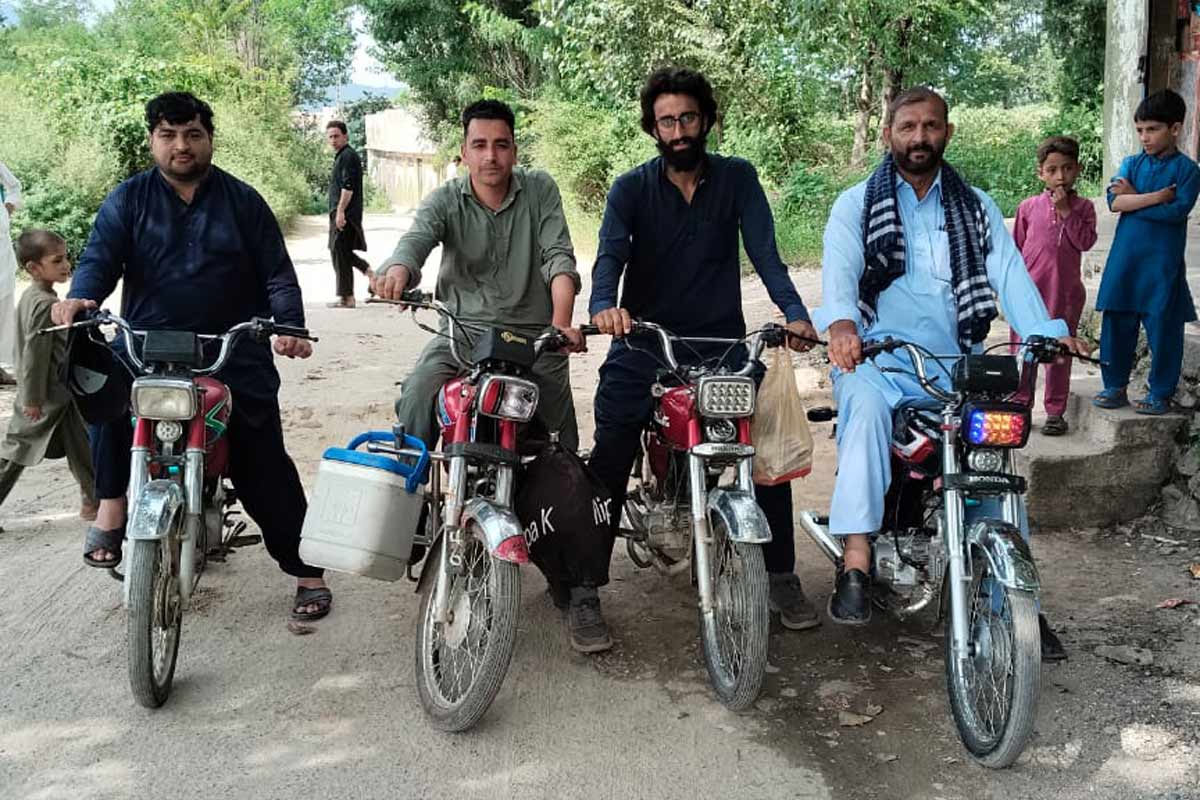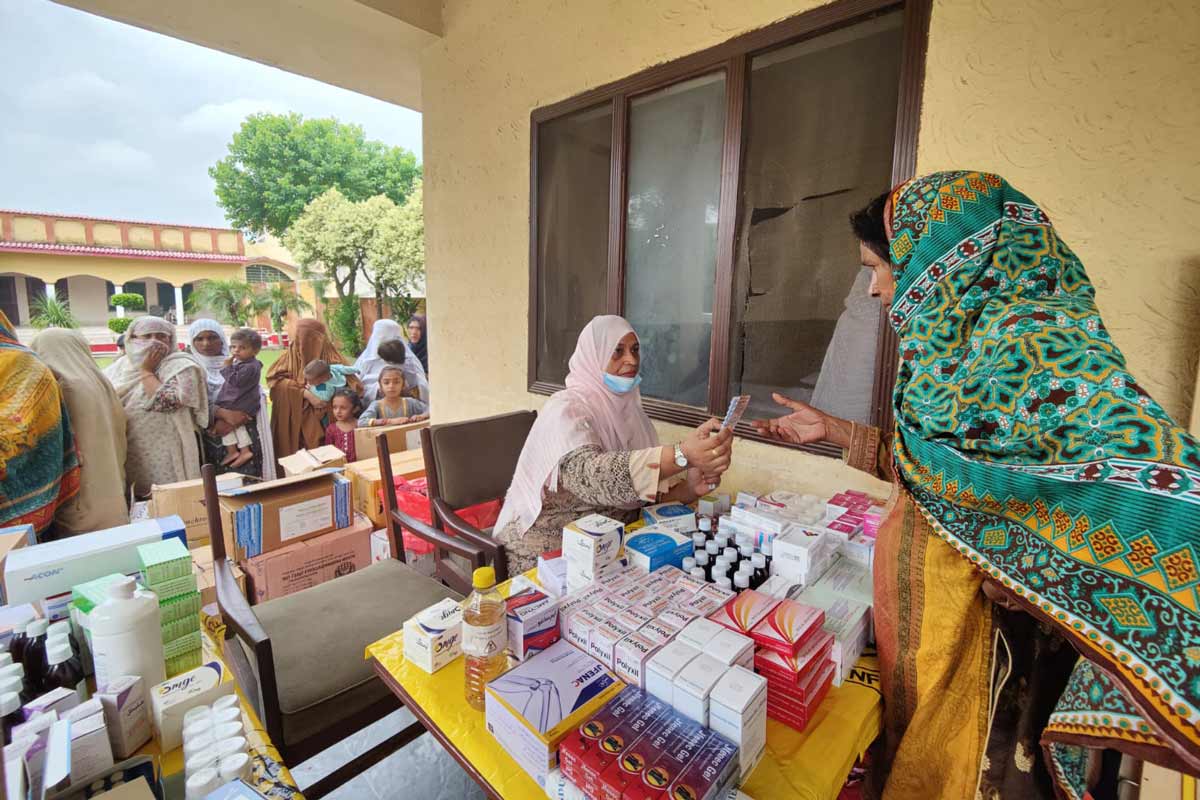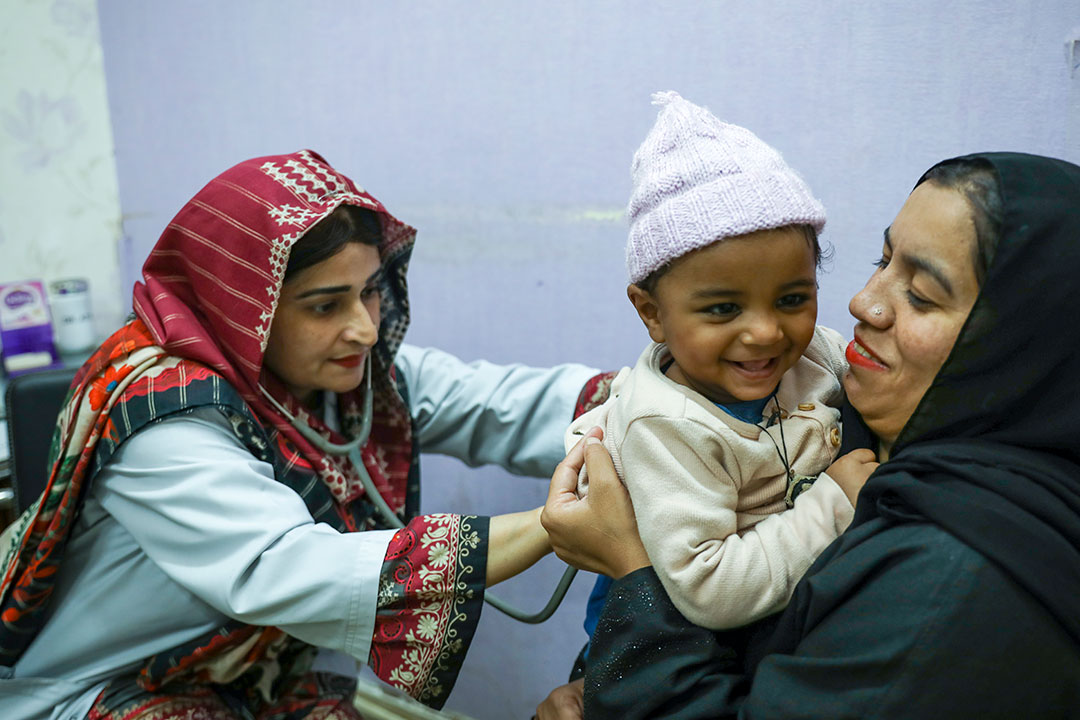“Clinics on wheels” bring healthcare to underserved doorsteps in Pakistan
More underprivileged kids in the province are getting vaccinated, and more ill people cared for, since Punjab launched the mobile healthcare programme.
- 11 August 2025
- 6 min read
- by Rahul Basharat Rajput
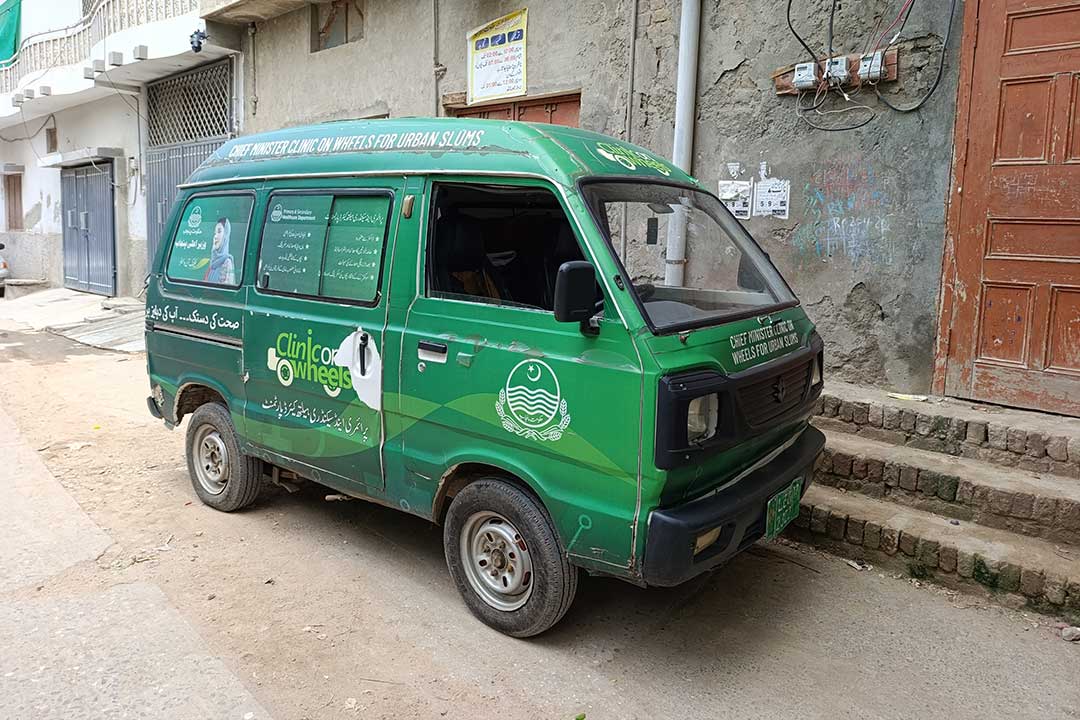
In Punjab, Pakistan’s most populous province, healthcare is trundling along narrow alleys and parking up in urban slums.
Rawalpindi city – enormous, densely inhabited, lying cheek-by-jowl with the federal capital Islamabad – struggles with an imbalance between healthcare resources and demand. It’s a hotspot of contrasts: five kilometres and a small bridge over a seasonal stream separate the office of the District Health Authority from the area of Phagwari, an urban slum.
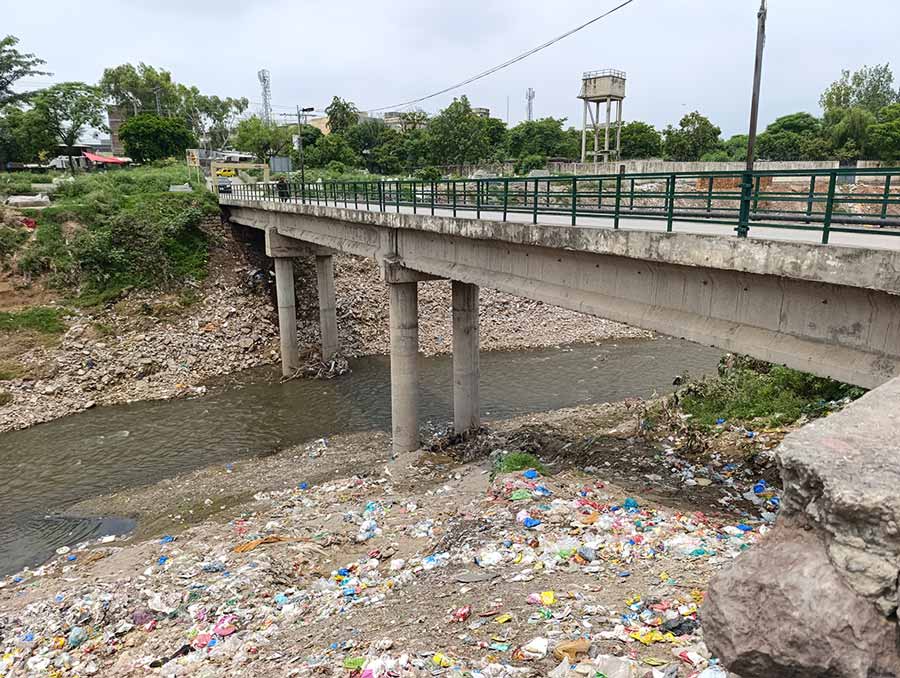
Credit: Rahul Basharat Rajput
Amid densely built vertical houses and narrow streets, a green vehicle is parked, bearing a picture of Punjab’s Chief Minister, Maryam Nawaz, and the words Clinics on Wheels – the name of new healthcare initiative that is helping boost immunisation rates in vulnerable communities.
What is a Clinic on Wheels?
Launched in 2024 by the Punjab provincial government, the Clinics on Wheels programme was introduced to address the lack of healthcare infrastructure in urban areas.
Under this initiative, mobile clinic vans enter densely populated urban settlements where people lack access to basic healthcare and provide medical services at underserved residents’ doorsteps.

Credit: Rahul Basharat Rajput
There are currently 244 such Clinics on Wheels operating across Punjab. Out of these, 202 are vehicles used for transporting medicines and staff to underserved communities, and 42 are equipped with mobile ultrasound facilities.
Disadvantaged millions
According to the Punjab Urban Slum Survey conducted by the Punjab Bureau of Statistics, approximately 7.2 million people reside in urban slums across the province, representing a considerable portion of Punjab’s 128 million-strong population.
As per the Punjab Demographic and Health Survey (PDHS) 2019–2020, residents of these slums face higher rates of communicable diseases, maternal and child health issues, and tend to have limited access to preventive and curative health services. The study also revealed that only 57.2% of slum residents have access to health facilities, further deepening existing disparities in healthcare access.
Building out the missing infrastructure is complicated, long-term project. Loading healthcare workers, medicines, equipment and, of course, vaccines into vans is quicker.
Punjab has Pakistan’s highest immunisation rates, but the 89% coverage recorded by the province against 12 vaccine-preventable diseases is not equitably spread out across the population. Among the Clinics on Wheels programme’s key objectives are ensuring full immunisation coverage for children under two years of age and facilitating the diagnosis of hepatitis B and C.
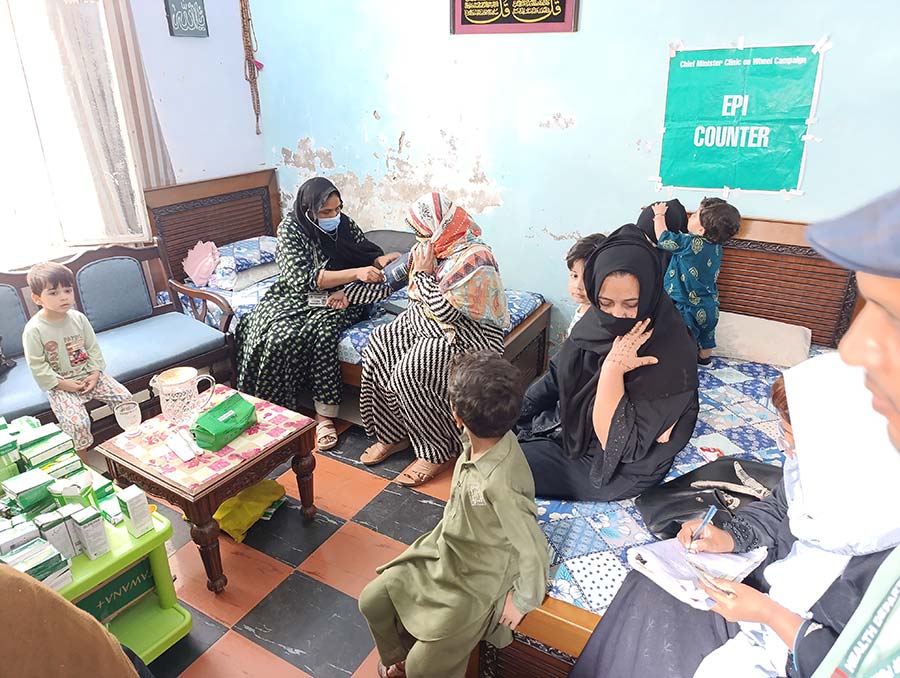
Credit: Rahul Basharat Rajput
“Remarkable step”
That means targeting areas where coverage may be thinner, like the Rawalpindi slum where Kiran Bibi, aged 38, lives.
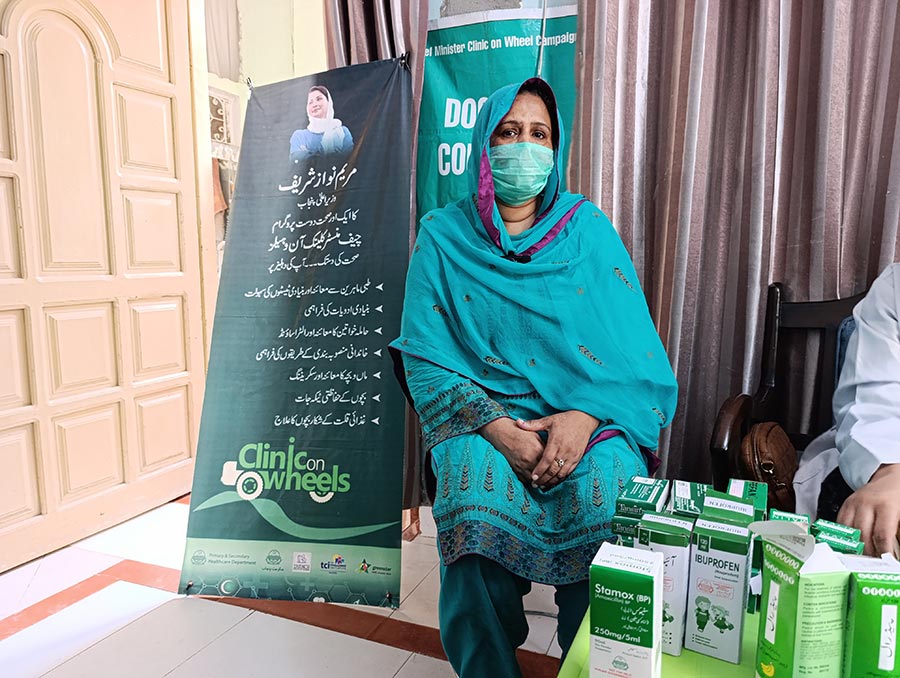
Credit: Rahul Basharat Rajput
She considers the project a game-changer for Phagwari women. “The biggest convenience is that we no longer need to visit hospitals or wait in long queues,” said Kiran. Making that journey can have an unaffordable cost to a poor family; waiting in lines might mean missing a day of work.
“This is truly a remarkable step that has brought quality healthcare to our neighbourhood,” she said.
Have you read?
“Solvable issues”
Although the Clinics on Wheels programme was considered a commendable initiative by the deserving individuals and the Health Department figures VaccinesWork spoke to, the programme has not been immune to constructive feedback from locals.
Tariq Ahmed, a resident of Dhoke Najoo in Rawalpindi, said that while the programme benefits underprivileged people, especially women and children, coordination with those communities could be improved.
He said in some areas, the Clinics on Wheels teams arrive without prior notice to local residents, which leads to administrative challenges.
“For example, many people are away from home during the day due to work and therefore cannot benefit from these clinics. Or when the teams reach the community, they sometimes struggle to find a suitable place to set up camp,” Ahmed said.
According to Ahmed, there have even been instances where the number of people turning up for outpatient services was high, but the teams lacked adequate space and facilities to serve them all.
“But all these are solvable issues,” he added. “If the Health Department improves its coordination with local political leadership regarding the programme, these gaps can be addressed.”
All aboard
Talking to VaccinesWork at one Phagwari medical camp, Woman Medical Officer Dr Afifa Zahid, explained her team’s set-up. “As a doctor, I lead this team, which includes a Lady Health Visitor (LHV), a dispenser, a vaccinator, and Lady Health Workers (LHWs).”
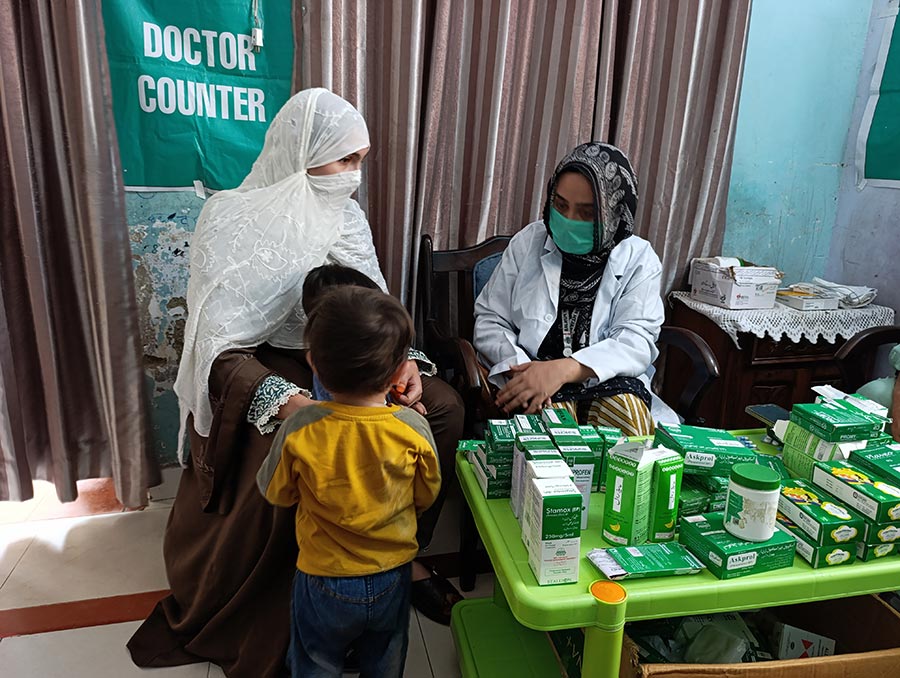
Credit: Rahul Basharat Rajput
“Our operations are well-organised. Locations are pre-determined, and we plan on a monthly basis. We set up camps twice a month in each area. Before arriving, announcements are made in local mosques, and LHWs go door to door to inform the community about the camp and available services.”
She said the healthcare team provide general consultations, antenatal check-ups for pregnant women, and postnatal services. Children’s vaccinations are administered per the EPI schedule, she added, and pregnant women receive tetanus vaccines and other essential preventive care.
Dr Afifa said these mobile clinics are deployed effectively and deliver services within communities on a daily basis. “Our daily Outpatient Department count reaches around 100 patients, and sometimes we even attend to more than 150,” she added.
“Clear improvement”
Dr Naveed Malik, In-Charge of Clinics on Wheels for all of Rawalpindi, told VaccinesWork that Clinics on Wheels are providing specialised EPI services across the city.
“We ensure vaccine availability and deliver immunisation services on the spot to all eligible children and patients visiting the clinics,” said Dr Malik.
Dr Malik emphasised that the programme has improved EPI coverage by easing the burden on already stretched parents. “This service now reaches their doorstep. We are witnessing clear improvement in performance on both daily and monthly levels,” Dr Malik said.
According to Dr Ehsan Ghani, Chief Executive Officer of the District Health Authority Rawalpindi, a total of 45 mobile clinics are currently operational in Rawalpindi. Among them, 35 vans are equipped with a standard suite of medical facilities, while 10 are also ultrasound-enabled.
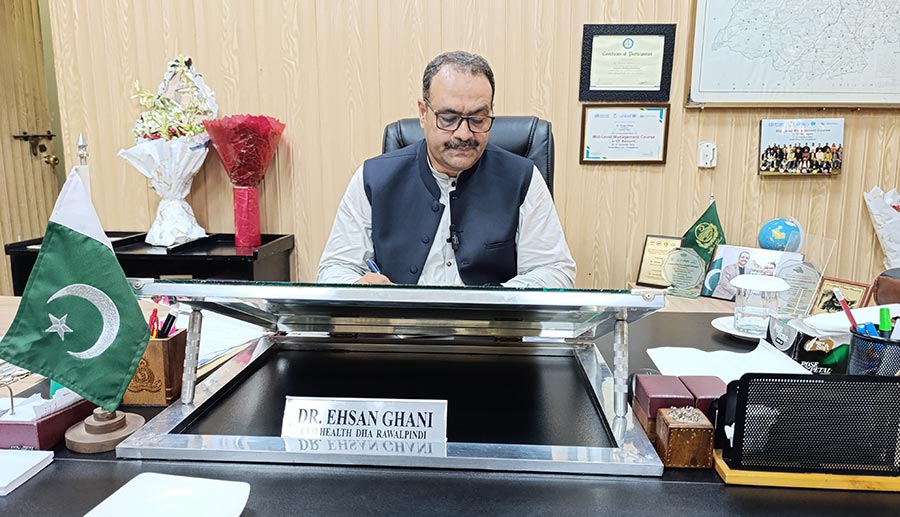
Credit: Rahul Basharat Rajput
He said this initiative specifically targets low-income urban areas with high disease burdens. Around 500,000 to 550,000 people in these areas are benefiting from a Clinic on Wheels.
That’s having a direct impact on disease control. According to Dr Ghani, timely diagnoses are being ensured, and an effective referral system has also been put in place to ensure that complex cases reach major hospitals promptly.
Wider access to immunisation, meanwhile, tamps down the risk of spread. “To bridge the gap between the growing population and immunisation needs, each van is staffed with a vaccinator who actively administers missed or incomplete vaccines to children in the field. This has led to improved vaccination rates and has made significant progress in the fight against diseases like polio,” said Dr Ghani.
He also said community response to the initiative has been overwhelmingly positive. A well-coordinated plan has been developed for each Union Council, ensuring effective deployment of mobile clinics through collaboration with local representatives, community leaders and elected parliamentarians.
“This is undoubtedly a successful and welfare-oriented initiative. With expansion, this programme has the potential to bring healthcare services to even more people across Punjab,” said Dr Ghani.
